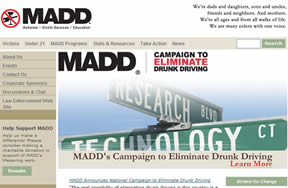
 |
|
Photo Gallery | Weather | Reuters Videos | Links | Webcams | Alaska Jobs | Wall Street | Science | RSS | |
Technology in cars may help reduce drunken drivingNovember 22nd, 2006Washington, D.C. - Mothers Against Drunk Driving (MADD) launched a new campaign which it proposes that alcohol-detection technology be used by drivers to disable their automobiles if they are found to be over the legal blood alcohol limit. 
"If we can't stop drunks from driving, we'll stop vehicles from driving drunks," Glynn Birch, president of MADD, said. MADD, an organization that works to stop individuals from operating vehicles while under the influence of alcohol, as well as build awareness of the issue, announced the first stage of the plan in Washington Monday, and it was to be backed by a national association of state highway representatives and car producers. The initial phase includes an effort to modify existing drunken-driving regulations in 49 states to include a mandate that would order people convicted on drunken-driving charges to install devices that shut down their vehicles if alcohol is detected on their breath, the Times reported. The devices, dubbed ignition interlocks, are already used in several states for people who have been convicted of drunken driving on numerous occasions. New Mexico last year passed a law that requires first-time drunken-driving offenders to employ ignition interlocks, and attributed its 11.3 percent drop in related fatalities last year in part to the use of the devices, though the regulation wasn't official until June 17, 2005. Bill Richards, New Mexico governor, called the devices "an integral part of our success," according to the Times. MADD and the other groups involved don't think the devices are a complete solution to the drunken-driving problem in the United States, as they can easily be deceived if a sober passenger or bystander blows into the Breathalyzer tube, but they do say the ignition interlocks will likely reduce the number of repeat offenses. The groups eventually want every vehicle to include a non-obtrusive form of ignition interlock that would test drivers for alcohol in a way that wouldn't impede normal actions. MADD Chief Executive Officer Chuck Hurley suggested that car insurers may eventually offer discounts and additional incentives to individuals who employ such technologies. The parties also detailed Monday a new initiative with the Department of Transportation aimed at boosting enforcement of drunken-driving laws and related penalties. © AlaskaReport News |
|